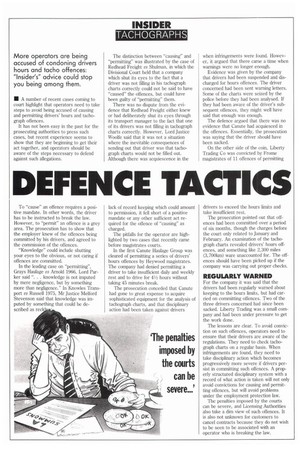DEFENCE TACTICS
Page 28

If you've noticed an error in this article please click here to report it so we can fix it.
More operators are being accused of condoning drivers hours and tacho offences: "Insider's" advice could stop you being among them.
• A number of recent cases coming to court highlight that operators need to take steps to avoid being accused of causing and permitting drivers' hours and tachograph offences.
It has not been easy in the past for the prosecuting authorities to press such cases, but recent experience seems to show that they are beginning to get their act together, and operators should be aware of the steps necessary to defend against such allegations.
To "cause" an offence requires a positive mandate. In other words, the driver has to be instructed to break the law. However, to "permit" an offence is a grey area. The prosecution has to show that the employer knew of the offences being committed by his drivers, and agreed to the commission of the offences.
"Knowledge" could include shutting your eyes to the obvious, or not caring if offences are committed.
In the leading case on "permitting", Grays Haulage vs Arnold 1966, Lord Parker said ". . , knowledge is not imputed by mere negligence, but by something more than negligence." In Knowles Transport vs Russell 1975, Mr Justice Melford Stevenson said that knowledge was imputed by something that could be described as reek! The distinction between "causing" and "permitting" was illustrated by the case of Redhead Freight vs Shulman, in which the Divisional Court held that a company which shut its eyes to the fact that a driver was not filling in his tachograph charts correctly could not be said to have "caused" the offences, but could have been guilty of "permitting" them.
There was no dispute from the evidence that Redhead Freight either knew or had deliberately shut its eyes through its transport manager to the fact that one of its drivers was not filling in tachograph charts correctly. However, Lord Justice Woolfe said that it was not a situation where the inevitable consequences of sending out that driver was that tachograph charts would not be filled out. Although there was acquiescence in the lack of record keeping which could amount to permission, it fell short of a positive mandate or any other sufficient act required for the offence of "causing" as charged.
The pitfalls for the operator are highlighted by two cases that recently came before magistrates courts.
In the first Canute Haulage Group was cleared of permitting a series of drivers' hours offences by Heywood magistrates. The company had denied permitting a driver to take insufficient daily and weekly rest and to drive for 41/2 hours without taking 45 minutes break.
The prosecution conceded that Canute had gone to great expense to acquire sophisticated equipment for the analysis of tachograph charts, and that disciplinary action had been taken against drivers when infringements were found. However, it argued that there came a time when warnings were no longer enough.
Evidence was given by the company that drivers had been suspended and discharged for hours offences. The driver concerned had been sent warning letters. Some of the charts were seized by the police before they had been analysed. If they had been aware of the driver's subsequent offences, they might well have said that enough was enough.
The defence argued that there was no evidence that Canute had acquiesced in the offences. Essentially, the prosecution was saying that the driver should have been sacked.
On the other side of the coin, Liberty Trading Co was convicted by Frome magistrates of 11 offences of permitting drivers to exceed the hours limits and take insufficient rest.
The prosecution pointed out that offences had been committed over a period of six months, though the charges before the court only related to January and February. An examination of the tachograph charts revealed drivers' hours offences, and something like 2,300 miles (3,7001(m) ware unaccounted for. The offences should have been picked up if the company was carrying out proper checks.
REGULARLY WARNED
For the company it was said that the drivers had been regularly warned about keeping to the hours limits, but had carried on committing offences. Two of the three drivers concerned had since been sacked. Liberty Trading was a small company and had been under pressure to get the work done.
The lessons are clear. To avoid conviction on such offences, operators need to ensure that their drivers are aware of the regulations. They need to check tachograph charts on a regular basis. When infringements are found, they need to take disciplinary action which becomes progressively more severe if drivers persist in committing such offences. A properly structured disciplinary system with a record of what action is taken will not only avoid convictions for causing and permitting offences, but will avoid problems under the employment protection law.
The penalties imposed by the courts can be severe, and Licensing Authorities also take a dim view of such offences. It is also not unknown for customers to cancel contracts because they do not wish to be seen to be associated with an operator who is breaking the law.












































































